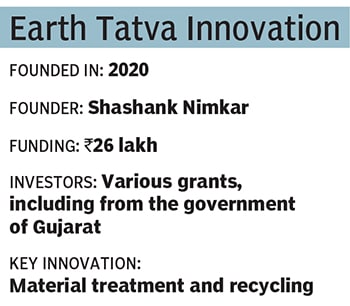Earth Tatva: Recreating from ceramic waste
Archaeology has shown that ceramics don't biodegrade for centuries, however, production rejects end up in landfills over decades. Earth Tatva procures them from industries and turns them into reusable


Multiple startups are applying innovation to address various aspects of sustainability and pollution, and creating new-age products with multiple use cases. Read about some key companies here.
Archaeology has shown us that ceramics don’t biodegrade for centuries. Ceramic industries today are facing the daunting challenges of what to do with their production rejects being landfilled over decades," says Shashank Nimkar, founder of Earth Tatva.
At Earth Tatva, pre-consumer landfilled ceramic rejects are procured from industries and turned into reusable material from which any existing ceramic products can be made. “Our patented recycled ceramic material, TatvaMix, reduces mining for natural resources by 60 percent, is 35 percent stronger than conventional ceramics, uses lesser energy to fire, has high quality aesthetics and is 100 percent recyclable. Essentially, doing more and better with less," says Nimkar. This initiative is directly supporting UN SDG-12, which is Responsible Consumption and Production.
Nimkar has been recognised as ‘Circular Economy Pioneer’ by Ellen MacArthur Foundation in 2019, and was the national winner of the James Dyson award, and the Circular Economy Challenge by Ekonnect in 2020.
 Since Earth Tatva is launching a direct-to-consumer channel, there are no B2B orders yet. However, it has received inquiries from companies such as Kohler, Fabindia, H&M Home, Sangath Architects, Reliance Industries and Anthropologie.
Since Earth Tatva is launching a direct-to-consumer channel, there are no B2B orders yet. However, it has received inquiries from companies such as Kohler, Fabindia, H&M Home, Sangath Architects, Reliance Industries and Anthropologie.
“As it is an IP-based material, it is challenging to be able to outsource production of finished goods to existing manufacturers. Streamlining in-house production at a relatively smaller scale is weighing down progress," says Nimkar. “We have figured things out for our context and are now moving ahead to streamline our in-house production until we are able to find a way to collaborate with existing manufacturers without jeopardising our IP."
However, Nimkar is optimistic. He feels that the market is promising for brands like his. Consumers are aware, and the social and environmental impact is a latent need. “So far, this is the best time to put our innovation out into the market to strengthen the circular Indian industrial ecosystem and also globally as we scale up," says Nimkar.
First Published: May 27, 2022, 12:21
Subscribe Now